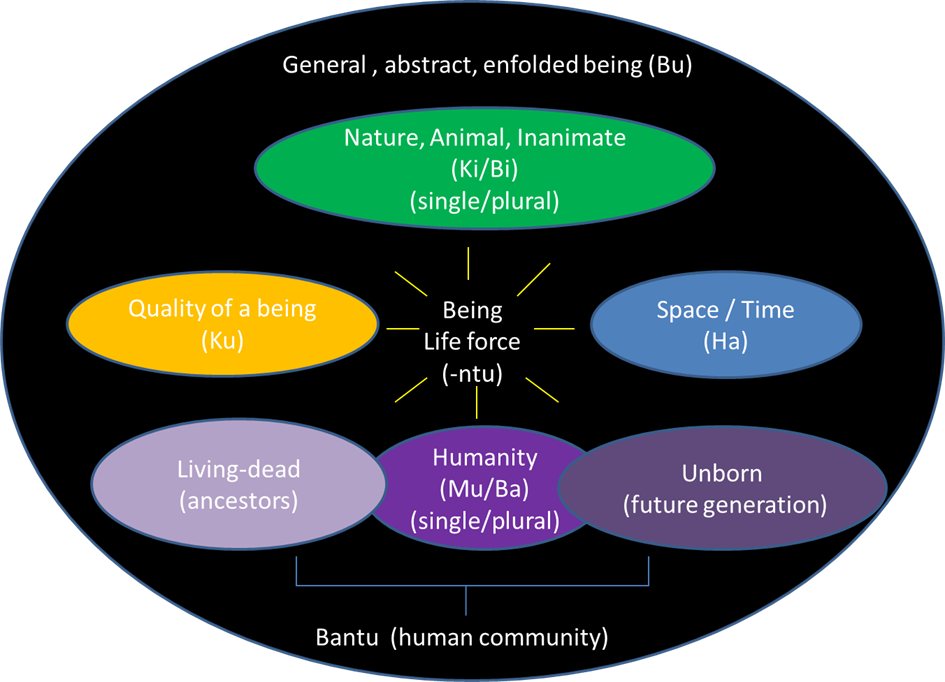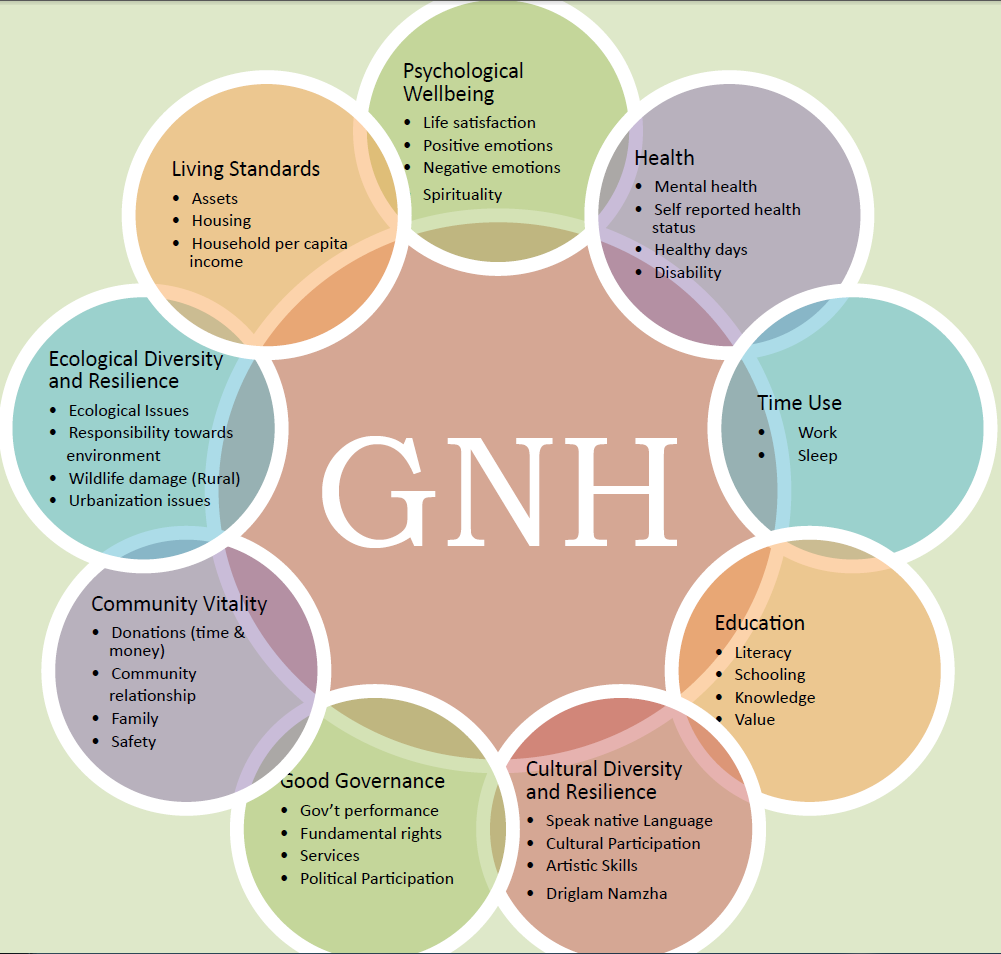Traditions from the Global South can inform solutions of Building Back Better after the COVID-19 pandemic. African Ubuntu emphasizes the importance of collective responsibility in combatting COVID-19 and offers insights for a new economic order based on sharing and solidarity. Latin American Buen vivir advocates for markets based on use value (not speculative) and harmony with Nature. Asian Gross National Happiness (GNH) philosophy promotes inner peace and respect for all sentient beings. These traditional ideas go against the current ‘Western’ capitalistic paradigm, which is putting economy before society and nature. The COVID-19 pandemic exposed challenges of this current model and an urgent need to transform towards a more sustainable society. Transitioning to a new (economic) world order post COVID-19 will require global efforts and serious rethinking of a number of key issues. Learning from multiple worldviews and different cultures may bring many benefits and accelerate this transformation process.
COVID-19: causes and consequences
The world risks facing a lost decade due to the COVID-19 pandemic. The virus has exposed economic and political vulnerabilities (such as disrupted global value chains, debts, increased global rivalry, a faltering multilateral system and civil liberties under pressure) as well as the risks of zoonotic viruses spreading in environmentally degraded environments. It also uncovered challenges of the current ‘Western’ capitalistic cosmovision, which is based on GDP growth of production and consumption, and largely based on extractivism and use of natural resources. However, the COVID-19 outbreak also offers an opportunity for transformation towards a more sustainable society (Building Back Better) or one living more in harmony with Nature. Transitioning to a new (economic) world order post COVID-19 will require global efforts and serious rethinking of a number of key issues, such as:
- globalisation: producing locally vs globally; free trade vs protectionism?
- taxation: who to tax and who to benefit?
- international financial & trade flows: speculation vs corporate responsibility?
- democracy and the rule of law: privacy and regulation vs surveillance & data collection?
- geopolitical between states, regions, and in multilateral institutions (like the IMF/ UN): rivalry vs solidarity?
- dealing with transborder, collective problems (climate, health etc): market vs collective resource management recognising Global Public Goods/Commons?
The ideas from literature and traditions from the Global South, such as Ubuntu from (South) Africa, Buen Vivir from Latin America and Gross National Happiness from Asia (Bhutan) may serve as a source of inspiration for this transformation process.
The sharing society: African Ubuntu – I am because we are
Ubuntu is a collectivist worldview, based on the principle of sharing and intergenerational solidarity. People (bantu) consists of the ancestors, the present generation and the unborn generations. Ubu-Ntu philosophy is based in the grammar of the word: it refers to the abstract BU (before coming into being) (masculine patterns), being brought to life by the life force NTU (feminine creation). It means everything is connected and interdependent through the life force, like the people (Ba-Ntu) with nature (Ki-Ntu or Kintu). Ubuntu emphasizes duties towards the community and is therefore conducive to taking collective responsibility in combatting Covid 19, but it may also offer insights for a new economic order based on sharing and solidarity. The adagium no-one is useless, implies full employment and inclusion of all, equality and equity and respectful human relations as paramount, not abstract development.

Living in harmony with Nature: Ecuadorian Buen Vivir/Sumak Kawsay
Buen Vivir means Good Living (Sumak Kawsay in Quecha language, indigenous people living in Bolivia, Peru, Ecuador and Chili) or the right way of living. It is a biocentric worldview, centred around sacred Mother Earth. It emulates living in harmony with Nature, others and yourself, balancing spiritual and material wealth, respecting the cycles of Nature and time. The human is a subject and equal to all other living beings (animate and inanimate). This has led to recognizing Rights of Nature in the constitution of Ecuador and Bolivia, as well as calls for plurinational and intercultural states. Nothing in life is stable, everything grows and decays in cyclical movements. Linear development and endless growth are therefore impossible. Maintaining horizontal reciprocal relations is the purpose of life, recognizing complementarity, integrality and interrelationships. Buen vivir advocates for food and energy sovereignty, markets based on use value (not speculative), interculturality and generally respecting (diverse) communities’ autonomy to live in harmony with nature.
The emphatic economy: Gross National Happiness (GNH)
Gross National Happiness is a philosophy promoted by the government of Bhutan. GNH is founded on Buddhist believes in balancing (yin-yang) of feminine and masculine principles, the four noble truths (life is suffering, based in material craving; we need to free ourselves from the desire for the material, by engaging in the eightfold path towards enlightenment). GNH is based on four pillars: culture as the basis of identity, socio-economic wellbeing, respect for nature and good governance, as expressed in nine domains among which community vitality, balance between rest and work, cultural diversity, psychological wellbeing and ecological diversity are important. It can be measured using the GNH Index.

Comparison of values
The logic of development is not the same across cultures and therefore also the logic of putting economy before society and nature is not self-evident. In the West development is defined as sustainable economic growth. In Ubuntu and in Africa in general, society comes first; in Buen Vivir Nature comes first; and in Buddhist Happiness inner peace is paramount. Likewise, the word sustainability is a Western word, that encompasses balance between the economic, social and environment (that which environs the human, thus an anthropocentric approach). The global south speaks about respecting nature like other humans and intergenerational solidarity (Ubuntu), living in harmony with Nature (indigenous) and respecting all sentient beings (Buddhism). One could say that Western society is individualistic and rights and freedom oriented, Ubuntu is collective and communal oriented focusing on duties and boundedness, likewise Buen Vivir is collective and community oriented, calling it relationality (including with Nature). Finally, GNH is taking a position in-between, emphasizing codependent origination of all things arising simultaneously (see Table 1 for the comparison). This emphasizes the interdependence of all systems, whether human, eco or other. Its inner personal orientation ties up with Western ideas of self-development; and its community orientation links with ideas of social cohesion, guardianship and looking after the Global Commons.
| Western | Ubuntu | Buen vivir | GNH |
| Leave no-one behind (SDGs); growth, extractivism & redistribution | Life is mutual aid | Let Mother Earth lead | Respect all sentient beings |
| Development, GDP growth of production & consumption | Harmonious intergenerational human relations | Harmonious biocentric relations | Inner peace and harmony |
| Sustainability
Economic+ social+ environment (conservation) |
Sharing with one-another and Nature | Living in harmony with Nature the life-giver | Respect and revere sacred Nature |
| Individualist
Rights + Freedom |
Collective
Duties + boundedness |
Collective
Relationality |
In-between
Co-dependence/care |
Table 1 Comparison Western development versus Ubuntu, Buen Vivir, GNH (© D. van Norren)
Conclusions
The principles of Ubuntu (sharing and accountability to past and future generations), Buen Vivir (harmony with the Earth and a horizon of 7 generations or 400-500 years) and GNH (compassion with all beings and honoring local identities) call for modifications of current economic systems and challenge the centrality of the economy in all of our thinking. The Covid 19 pandemic has been a major disruptor and many changes going in that direction are already taking place, such as:
- globalisation and ‘development’: we observe reshoring of activities (back to home countries instead of fragmented and outsourced to cheap labor countries) and trends of working at home in the digital age. Could this mean a (partial) return to producing locally and responsible trade, bringing us closer to autonomous communities with food and energy security (supported even in some conservative circles), living in a healthy environment; and redefining our concept of development?
- taxation: clamors are louder for protecting the environment and ensuring multinational tax income. Could this lead to taxing pollution and CO2 emission, taxing data collector monopolies (google, facebook), preventing tax havens (and generally holding accountable those who commit crimes of ecocide), providing other forms of innovative finance, financing the commons (collective self-governance) and (instead of taxing) rewarding labor and creativity, striving at inclusion and employment for all?
- international finance & trade flows: awareness on the need of preventing disruptive speculation is rising especially since the financial crisis of 2008. Could we start collecting revenue whilst curbing speculation by taxing financial trade flows (Tobin-tax); And instead of a speculative market value return to use value of goods, including for housing, food and other (agricultural) products, providing in basic needs for all?
- democracy and the rule of law: voices for protecting privacy (especially in data collection economic models), cohesion and solidarity are getting louder throughout the COVID-19 crisis. Are we going to move towards responsible surveillance & data collection; community and solidarity rights and duties (i.e. in obtaining a vaccine for all); and is there room for rights of Nature as being part of the community of life (contributing to prevention of pandemics)?
- geopolitical rivalry vs solidarity between states, regions, in multilateral institutions (like the IMF and UN) (climate, health etc). Could cooperation become our organizing principle; balancing the need for competition and cooperation, in societies that are now geared towards individualist goals and competing interests?
- dealing with current transborder, collective problems: Will new forms of cooperation such as managing the Global Commons, City Commons, Global Public Goods (a largely Western term) and collective resource management based on worldviews from the Global South gain importance?
Accepting multiple worldviews could lead to greater understanding, convergence of ideas and solidarity. Therefore, applying the traditional principles from the Global South to a new (economic) world order post COVID-19 may bring many benefits but it would also mean a different way of organizing our global economy and society. Some may call this utopic, but these (new) ideals rooted in ancient traditions may be worth striving for.
This article is based on a paper for the South Korea UNESCO World Humanities Forum 2020 (Full article can be found here), to be published in its conference proceedings; video presentations on Friday 20 November together with Prof Mogobe Ramose (South Africa), Prof Alberto Acosta (Ecuador), Dr. Henk Jan (cross cultural bridges Amsterdam) and dr. Karma Ura (Bhutan). Watch other videos of conference.
